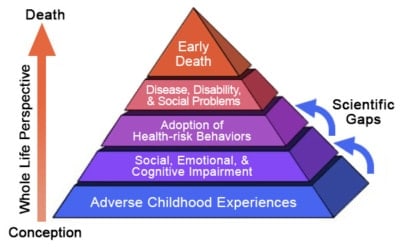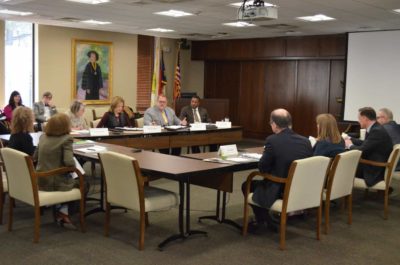
My mother tells me by the time I was two and could speak, she had to start beating me. My earliest memories are from age four and are riddled with images of verbal and physical violence against me and my brother at the hands of my mother, stepfather, aunt, and uncles.
My disability is not apparent, yet it has been present and acute since childhood.
This excerpt is from one of the personal stories featured in “On the Problematization and Criminalization of Children and Young Adults with Non-Apparent Disabilities.” The paper from the Ruderman Family Foundation looks at systemic discrimination against people with “invisible” disabilities throughout society—particularly, in our schools.
Non-apparent disabilities include autism, cognitive or learning disabilities, Crohn’s disease, chronic fatigue syndrome, dyslexia, and any number of mental illnesses. But let’s focus on one area of disability that often is not recognized by many caretakers, including school staff— trauma in childhood. Though “invisible,” unrecognized trauma can lead to severe consequences that derail a child’s opportunities to succeed in school and in life.
Adverse Childhood Experiences
This kind of trauma is often the result of Adverse Childhood Experiences (ACEs). Researchers have defined ACEs as:
- Physical, sexual, and verbal abuse
- Physical and emotional neglect
- A family member who is
- depressed or diagnosed with another mental illness;
- addicted to alcohol or another substance; or
- in prison.
- Witnessing a mother being abused
- Losing a parent to separation, divorce, or some other reason
This graphic from the U.S. Department of Health and Human Services’ Substance Abuse and Mental Health Services Administration (SAMHSA) shows how these traumatic experiences can put children on a painful and dangerous path. That second level – social, emotional, and cognitive impairment – is where schools and teachers must focus their attention. By recognizing and addressing the impairments caused by trauma, educators can tear down this pyramid and give a child the opportunity for a better, healthier life.

Trauma-Induced Impairments and Behaviors
Such impairments often mean that these children struggle in school, and there is extensive research showing that “when children fall behind their peers in the classroom, they become disengaged and disillusioned with the educational process as they do not believe it is one that works for them, and thus act out and misbehave,” according to the Ruderman report.
In addition to social, emotional, and cognitive impairments, children who experience trauma may develop mental health disabilities such as depression, anxiety disorders, post-traumatic stress disorder, disruptive behavior disorders, obsessive compulsive disorders, and insomnia. These conditions also may lead to the types of behaviors that get them punished, suspended, or even expelled.
It’s easy to see how suffering through traumatic experiences can result in trouble at school. A child who, for example, loses a parent because of divorce, has trouble sleeping and so cannot concentrate at school. She’s angry, frustrated, and falling behind, so she lashes out and ends up suspended from school. Now she’s suffering yet another loss.
Special education teachers need to be especially alert to the effects of trauma. Children with disabilities are almost two times more likely to be physically or sexually abused or neglected than children without disabilities. Therefore, a child with a known disability also may be suffering from non-apparent disabilities associated with trauma.
Helping Students
For children who have endured Adverse Childhood Experiences, a teacher may be the person who recognizes the effects and saves them from a life depicted in that pyramid above.
Buncombe County is working hard to integrate an understanding of ACEs throughout its communities. The county has a website dedicated to providing information about ACEs, and the Student Services page on the Buncombe County Schools website includes strategies for helping students and creating “compassionate schools.”
Here are some additional resources for educators interested in understanding more about ACEs.
Resilience: The Biology of Stress and the Science of Hope – if you can, go see this documentary! It reveals how toxic stress triggers hormones that wreak havoc on the brains and bodies of children, putting them at a greater risk for disease, homelessness, prison time, and early death. It also chronicles how trailblazers in pediatrics, education, and social welfare are using cutting-edge science and field-tested therapies to help children.
Advocates for Health in Action is presenting free screenings of Resilience at Marbles Kids Museum on January 10 and February 14. Go to resilienceinwake.eventbrite.com to reserve a seat. Disability Rights NC will show the film at its Disability Advocacy Conference in April.
ALIVE: Creating Trauma-Informed Schools has programs and resources for helping educators understand and address the effects of trauma on students. “Through specialized stress reduction sessions, classroom-wide psychoeducation, and school-wide early detection and screening, ALIVE aims to create an open conversation about the effects of stress, and link the students’ lived experiences with curricular material.” Make sure you check out Miss Kendra’s List on Child Safety.
The NC Resilience and Learning Project from the Public School Forum of NC works with high-poverty schools to develop trauma-sensitive schools using a “whole school, whole child framework.” The project recently launched a pilot program in two Edgecombe County schools where it will train educators and staff to identify and help students who have experienced ACEs.
The National Center for Trauma-Informed Care and Alternatives to Seclusion and Restraint is part of the SAMHSA and provides information about the trauma-informed approach and trauma-specific interventions.
Trauma and Learning Policy Initiative offers a free book entitled “Creating and Advocating for Trauma-Sensitive Schools.”
Treatment and Services Adaptation Center is a website supported by a team of clinicians, researchers, and educators who are respected authorities in the areas of school trauma and crisis response.




